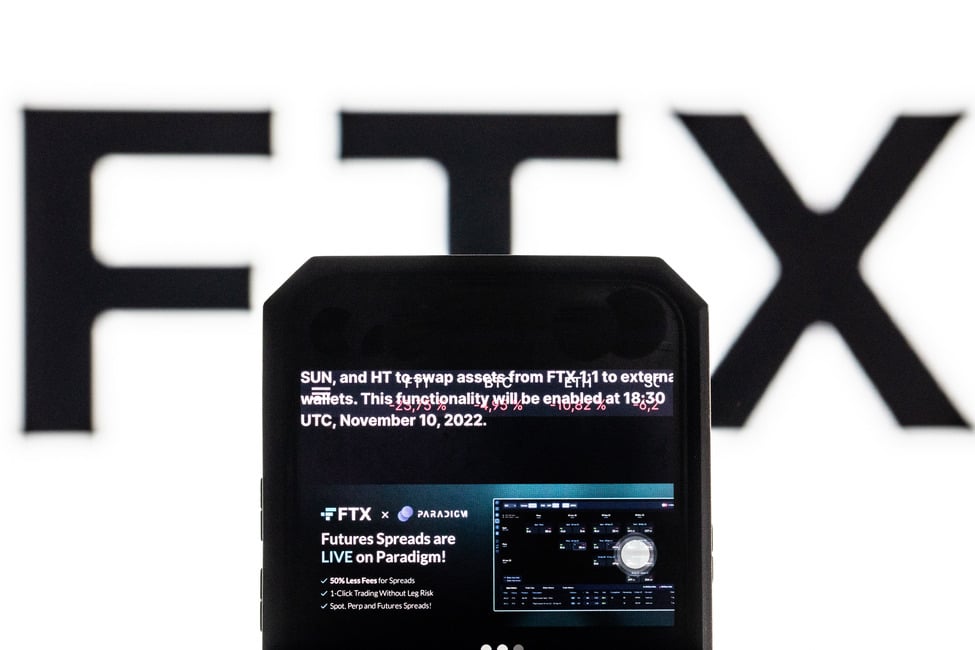A damaging year for cryptocurrencies, marked by leading currencies haemorrhaging value, has culminated in the demise of crypto exchange FTX and its founder Sam Bankman-Fried.
Former Wall Street trader Bankman-Fried and ex-Google employee Gary Wang founded FTX in May 2019 and acquired mobile portfolio tracking application Blockfolio for $150m the following August.
FTX was valued at $18bn following a $900m funding round in July 2021, rocketing the company to international renown and stoking further interest from investors.
The exchange was valued at $25bn after securing Singapore's Temasek and Tiger Global as backers in October 2021, and at $32bn in January after raising another $400m from investors including SoftBank.
During FTX's meteoric rises, the company signed sponsorship deals with Mercedes' Formula 1 team and to secure naming rights to the Miami Heat basketball team's home court, and Bankman-Fried appeared on the cover of Fortune and Forbes, which touted his personal wealth at around $17bn two months ago.
Irish unicorn Stripe agreed to handle payments for the company in March, at a time when FTX claimed that $14bn of transactions were being completed on its platform daily.
“We want FTX to become a trusted mainstream brand,” said Tristan Yver, head of strategy at FTX, at the time. “We’ve partnered with Stripe to help us transform what could be unintuitive crypto experiences into ones that exceed consumer expectations.”
In the midst of this year's crypto crash, FTX signed a deal with an option to buy crypto lender BlockFi for $240m, offered to bail out bankrupt crypto lender Voyager Digital in what Voyager called a "low-ball bid," and said it would buy a 30% stake in digital asset investment firm SkyBridge Capital.
US regulators in August ordered FTX to stop making "false and misleading" claims about whether funds at the company were issued by the government, and then at the start of this month it was reported that Bankman-Fried's crypto trading firm, Alameda Research, was heavily dependent on FTX's native token, FTT.

The following days saw Chinese rival Binance say it would liquidate its FTT holdings due to "recent revelations," and then a 72% fall in the price of FTT after the exchange was swamped with withdrawal requests.
Binance last Wednesday decided against a non-binding agreement to bail out FTX, causing the company to publicly flame out.
FTX suspended onboarding of new clients and withdrawals indefinitely the next day, and it was reported that Bankman-Fried was seeking to put together a $9.4bn rescue package for FTX just as the Securities Commission of the Bahamas froze the assets of subsidiary FTX Digital Markets.
Last Friday FTX said it would initiate bankruptcy proceedings, and Bankman-Fried resigned. "I'm really sorry, again, that we ended up here," Bankman-Fried said in a series of tweets after the commencement of the bankruptcy filing.
He added that filing "doesn't necessarily have to mean the end for the companies" and that he was "optimistic" the group's new CEO would "help provide whatever is best".
Investors such as Sequoia and SoftBank had already marked their investments in FTX to zero, while SkyBridge Capital sought to buy back its FTX stake.
FTT lost 89% of its value last week, and FTX is now being investigated by the SEC, the US Justice Department and the Commodity Futures Trading Commission in a stunning reversal of fortune for the company and crypto more widely.
"FTX is currently unable to process withdrawals," a message on the FTX homepage reads. "We strongly advise against depositing."
(Pic: Getty Images)










